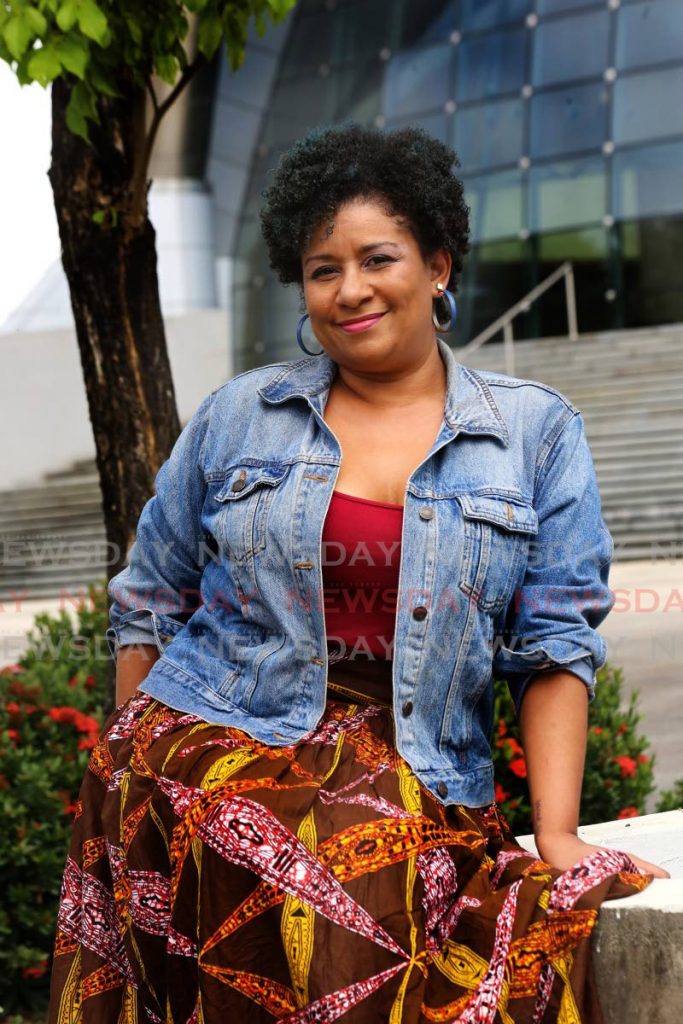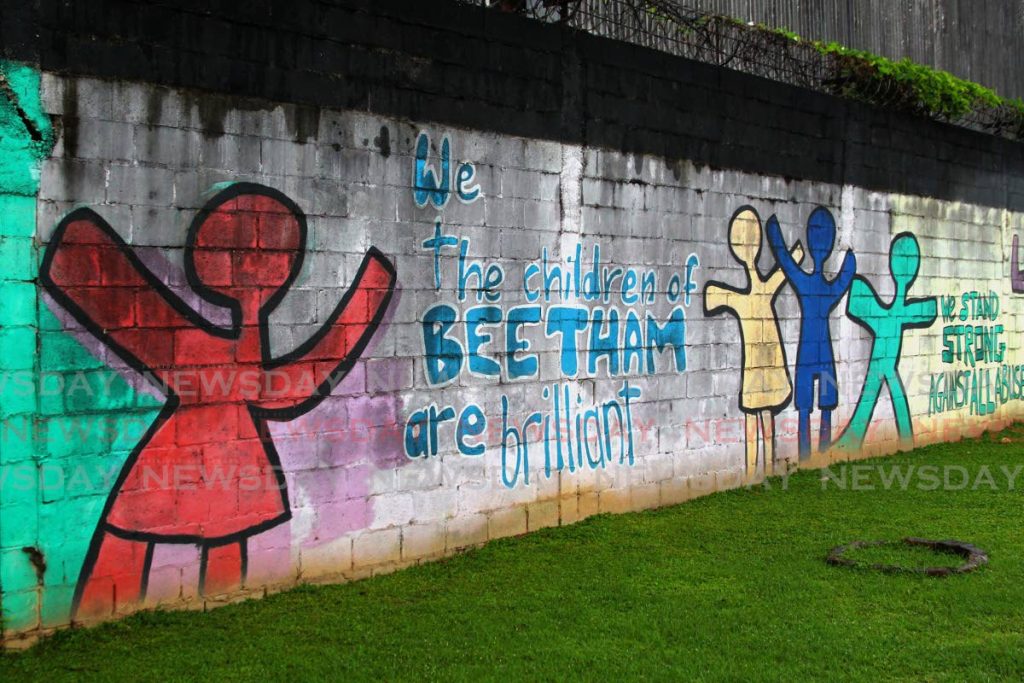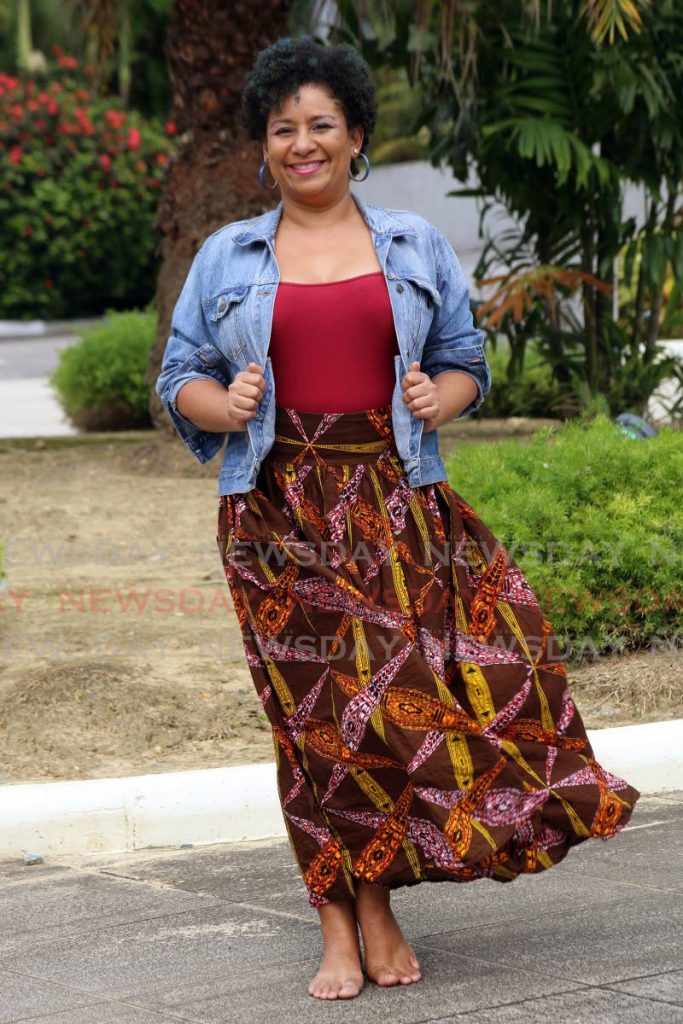Nadella Oya: A hard head that does good

Nadella Oya grew up with a strong sense of the importance of helping others.
It started with her family, was developed at Bishop Anstey High School, cemented by the Hezekiah sisters, and continued to grow until she was moved to start the NGO createfuturegood, 11 years ago.
Oya’s work was highlighted on November 21 when she was announced as the winner of the first Colin Robinson Hard Head Award during a virtual ceremony hosted by CAISO: Sex and Gender Justice.
She explained that createfuturegood team member, Theanna Alleyne, called one day and told her she would like to nominate her for the award. Months later she got a notification that she was shortlisted and a request for examples of her work.
All this time she did not pay it much attention because she was, and still is, striving to keep her organisation open during covid19. She was struggling to pay numerous bills, wondering if it should stay open during the pandemic, as well as considering the affect covid19 was having on the children and families with which the organisation works.
“You’re doing the work, and you’re telling yourself to keep going, but how much longer can you sustain this?”
Then came the Hard Head inaugural ceremony. She said the name of the award resonates with her because she is known as a stubborn, committed person. And the organisers seemed to recognise that.
“It was amazing. It was like a shot in the arm. Hard Head was the signal that I had to continue no matter whether the house falling down, whether we barely have resources to continue. It will come. Just keep going, one foot in front the next. It validates my reason for getting up every morning and doing this work whether I’m getting paid or not.”
And so she is considering covid19 as a blessing in a way.
“All the ills that children were experiencing bubbled right up to the top. It was a nasty thing to see the levels of abuse and hurt and pain and dysfunction that children and families were experiencing, including my own family. It has been hard for everyone.
“What is great about it though is that it tells us where we really need to focus our efforts. The need for adequate child protection strategies and resourcing is at an all time high. Effective mental health and wellness services, responses to child sexual abuse, parent and guardian support – all needed in comprehensive ways. Our children and families truly need bolstering at this time.”
She said createfuturegood is determined to help children and families come out on the other side of the pandemic stronger and more resilient.
Citizen and humanitarian
Oya said she has been involved in civil society “since the beginning of time.”
Her first sense of wanting to help came from her mother Helen, her aunt Pet and cousin Jacquie. Her family always had a sense of community and tried to help others.

“I realised as a child that giving of yourself, your gifts, talents and sometimes just your presence had an impact on others. That stuck with me.”
Her feeling of citizenship and humanitarian sensibility was honed during her time at Bishop's.
“Any Hilarian would say we have a sense of citizenship and agency. One thing that helps you identify a Hilarian is that we give. We see ourselves as part of an ecosystem. When we turn up we’re going to agitate and have that energy about it that if this thing not going right it hadda fix, it hadda change, it hadda do better. There was absolute joy in volunteerism and being part of a community that affected and affects the world.”
She also grew up around the Hezekiah sisters – Rosemarie Hezekiah, the late Allyson Hennessy, Sheelagh Besson and Judy O’Conner – and every Monday night they would make soup and sandwiches and feed the socially displaced of Port of Spain.
“Seeing adults on the street is one thing, children however, that resonated. These sisters gave of themselves, what little they could, regularly and religiously, and with a light heart.”
She said the experience made it clear to her that the family unit of a mother, father and children, needed “a metric tonne” of other resources including a community of support and access to services.
She went on to study for a diploma in arts and cultural enterprise management at UWI and then attended Maine Media Workshops for courses in directing, producing, and writing for documentary.
She worked in the creative industries as an illustrator, designer, carnival artist, and media producer. She said she got a “good grounding” working at companies like Rituals Music Label and Peter Minshall’s Callaloo Company.
“I found I was more of a story-sharer than a story-teller, and developed a great love-affair with documentary production. I loved that I could give a space for other people to tell their stories and that influenced my life as a media producer, director and writer.”
Somehow, she said, her work always involved giving children a voice.
“Throughout my career as a media producer and artist, I apparently always engaged children and provided a platform or space for them to be heard through their writings, their stories, their art. It wasn’t deliberate at first. It just was.”
Her work with children became more focussed in 2009 when her friend, Charlene Thompson, asked her to work with some adolescents on Unicef’s adolescent media campaign. She described it as the perfect platform to give children a working space to tell their stories from their perspective.
It also allowed her to learn about children’s rights and responsibilities, to investigate the issues that most affected them, come up with solutions, design campaigns to amplify their messages, and learn about target audiences and distribution.
It was eye-opening and led her to start createfuturegood, which she refers to as a social impact organisation, rather than an NGO.
Around the same time, the company with which she was working was finding ways, such as the Secondary Schools Short Film Competition, to help children to tell their stories. However, the sponsors found some of the material, which included topics like gun violence and child obesity, to be too hard hitting.
“I was annoyed. We needed to create a space to address hard issues like child sexual abuse and violence against children. I remember asking a good friend, child psychologist Cindy Theroulde, ‘What can we do to help these children?’ She simply replied, ‘Teach them how to protect themselves.’ That was all I needed to hear. We formalised createfuturegood.”

Oya said her daughter Yasu, 14, and son Cuba, 16, are the “primary teachers” for most of createfuturegood’s work. Yasu connects with participants and pays particular attention to children in the organisation’s projects. Cuba has appeared in and directed interviews for some of our campaigns, and is a child rights ambassador.
“Like a lot of mothers I don’t always feel I am doing the best by children. And my children have been exposed to the hard content of the work we do from an early age. I am grateful that they own their voice to speak up about the things that affect them, even when that means speaking up about me!”
Createfuturegood
The purpose of the organisation is to help children realise their power to do well for themselves, to enjoy their childhood, to ensure they are protected and can protect those around them. To help them understand, acknowledge, and accept that they may be little human beings but they have rights and responsibilities,
Oya said the organisation’s work is about awareness, education and prevention. It is not a responsive agency because it does not have the resources. Instead, it identifies the issues children face, and generates creative messages that do not “pretty it up” and that revolves around solutions. The messages also teach children the right language to use.
“We work towards changing thinking, attitudes and behaviour. Our work is decades long and we are cool with that. I want to be an old woman in a society of mindful people. This work is my pension. The children of 2020 will run the world in 20 years' time. Createfuturegood is literally doing just that – creating future good.”
She added that 50 per cent of the organisation is run by people under the age of 18.
“When I say run, they take part in our strategic development sessions for the organisation and not just campaigns. It’s half run by young people because I don’t intend to do this for the rest of my life and they have to start somewhere. But also because they are very capable and have amazing ideas and strategies.
“I can’t be sitting down in a cold office making decisions for people out there. They have to be at the table. They need to be exposed to it, experience it, and they need to be heard. We engage children to bring awareness to issues that affect children and how we could make it better.”
Createfuturegood’s work includes ad campaigns; workshops for children, adults, at corporations and schools; community-based interventions; and it shares its methodology and information with local and foreign organisations so people can adopt them.
The NGO is responsible for the mural near Beetham Gardens along the Priority Bus Route; videos about Good Touch, Bad Touch; Good Secret, Bad Secret; Yell and Tell, and more. The main focus is on audio visual packages because people have varying literacy level. The videos can also be taken and used free of charge because the point is to get the information to people who would not usually have the resources to do so.
The organisation also engages the adults in children’s lives such as parents, guardians, caregivers, teachers, coaches, and others so as to give them the tools to talk about difficult topics.
“Our works was giving children the information but it was also giving adults the information they did not have as well as the age-appropriate language to broach things with their children. Because how are going to talk to your five- or seven-year-old about sexual abuse?! You try to protect them and shield them from it but this time it’s your brother or uncle or aunt or cousin that is getting in with your child under your nose.”
Oya said the team has also engaged in high-crime communities where they are welcomed because many people in those communities want better for their children and do not want them to grow up in a life of crime.

She added that although they created the content for a Caribbean audience. Over the years they have received calls from all over the world, including Australia, Singapore, and Dubai, saying they saw the videos on cable or in classrooms.
“The work is of great quality but it’s amazing that it clearly resonates globally.”
In the future, Oya said she would like to continue to share stories, teach people across the globe how to help children amplify their voices, help develop physical and digital spaces for children to discover their gifts and learn how to be their best selves from an early age, help shift resources in countries to ensure positive social impact, and provide resources for “social impact warriors” so they could do their best work.
“We need to stop putting money behind locking up young men and giving pitiful handouts to teenage parents and lip service to young girls in the form of ‘empowerment initiatives’. We need to start developing children in real ways to ensure they positively contribute to society in mindful ways as they grow and evolve. If we can grow young people in evolved ways it will benefit everyone. I want to be part of that.”
Everyone can help
Oya said being an activist, getting up every day to try to bring awareness to issues, is not an easy thing to do.
She told WMN there is a misconception that all NGOs get a lot of funding but that is not the case. NGO funding is highly competitive and people have to “really believe in the cause” to keep going.
She said when people express their desire to start an NGO she tells them not to do it because the cause gets buried in administrative and organisational work. Instead, she recommends joining an existing NGO, do a project with them, gain experience, and learn how to run an NGO.
“It is hell work. It’s like you are working in the back of hell and you’re only paid through the fulfilment of the work. But it has to be done. Our createfuturegood family is made up of a tribe of people who themselves have been hurt or had something happen to someone close. We aim to get child abuse down to zero. There are too many children still suffering at the hands of adults who have unresolved trauma. We will work till every child can enjoy a better childhood.”
She encouraged people to support NGOs and individuals doing civil society, activism and advocacy work in any way possible. That help does not have to be in the form of donations. People can volunteer their time, office space, supplies, lend equipment, pay an NGO’s phone bill, buy gas for the organisation’s vehicle, and other ways.
For those who want to help but do not know how, she suggested that they pick up the phone, call, ask how they can help, and get it for them.
“Private citizens can realise their agency as well. Don’t wait for the government. Just do your part to be a better citizen. If you see your neighbour needs help, help them. If you need help, ask for it.”
She said she would love to see corporate TT and the government “rest their egos and PR faces aside,” roll up their sleeves and put their resources behind the people doing the hard work.
She encouraged them to use their skill, time, and money to help build the capacity of existing entities and therefore make a real and positive difference by taking a chance on some hard hitting issues.


Comments
"Nadella Oya: A hard head that does good"